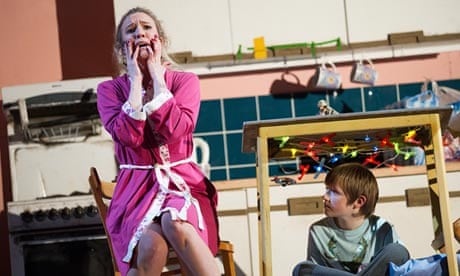Carrie Cracknell's new ENO production of Wozzeck relocates Berg's masterpiece to post-Iraq, recession-ridden Britain, and forges from it a bitter indictment of the political failures of our times. As an interpretation of Berg, it is at times wayward. But it makes for utterly compelling music drama and is particularly significant in restoring to the work its social conscience. We've become used, of late, to seeing Wozzeck in psychoanalytic or symbolist terms as an internalised, mental drama. Cracknell reminds us that the opera examines the impact of military trauma and grinding poverty in social as well as individual terms.
Leigh Melrose's Wozzeck, back from Iraq or Afghanistan and forgotten by the powers that sent him, now makes his living on the disenfranchised, criminal fringes of some urban hellhole by distributing drugs for Tom Randle's Captain and submitting for cash to the horrendous experiments of James Morris's megalomaniac Doctor. Sara Jakubiak's Marie, meanwhile, makes up a bed in her kitchen for her child by Wozzeck, before submitting to the advances of Bryan Register's brutal Drum Major. The interconnecting rooms of Tom Scutt's tiered set suggest a labyrinth from which no one can escape. Wozzeck's hallucinatory memories of war blend nightmarishly with the processions of coffins draped in union flags, and the tawdry world of sexual compulsion that surrounds him.
There are lapses along the way. The opera's emphasis on religious guilt is played down. Cracknell's decision to predicate Wozzeck's mental collapse on combat trauma sits uneasily with Berg's view of army life as being in itself institutionally abusive, and with the multiple ironies of a libretto that never tells us which of the characters has actually seen active service, and which has not. But there's no doubting the power of her staging, which seeps into your consciousness and won't let go.
Musically, it's astonishing. Melrose, giving the performance of a lifetime, charts Wozzeck's disintegration with unflinching veracity and an extraordinary expressive range that veers from lyrical intensity to snarl or eerie falsetto. Jakubiak's voice blazes with desire, defiance and despair. Morris terrifies, while Randle, obscenely tattooed and covered in bling, is at once charismatic and supremely sinister. This is another major achievement for conductor Edward Gardner, who is wonderfully alert to every nuance, while ratcheting up the intensity to almost unbearable levels at times. Not everyone, I suspect, will like it, but it's an outstanding achievement to which no one can remain indifferent.

Comments (…)
Sign in or create your Guardian account to join the discussion